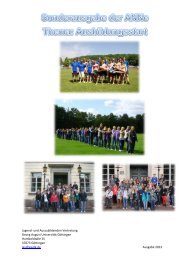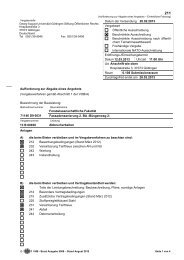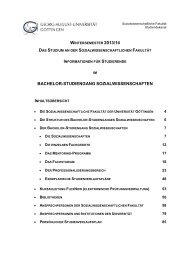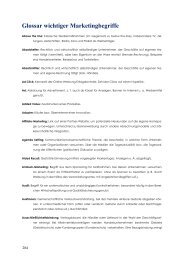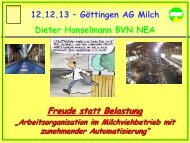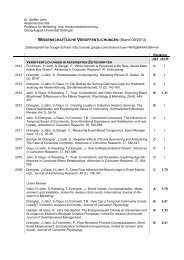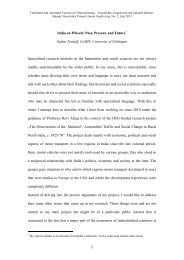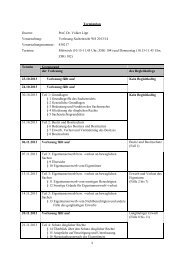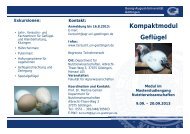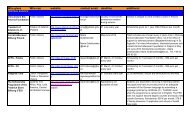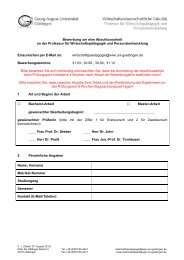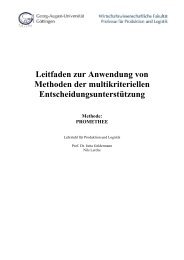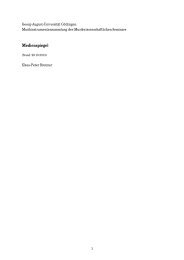CRC 990 - EFForTS - Georg-August-Universität Göttingen
CRC 990 - EFForTS - Georg-August-Universität Göttingen
CRC 990 - EFForTS - Georg-August-Universität Göttingen
You also want an ePaper? Increase the reach of your titles
YUMPU automatically turns print PDFs into web optimized ePapers that Google loves.
<strong>CRC</strong> <strong>990</strong> Ecological and Socioeconomic Functions of Tropical Lowland Rainforest Transformation Systems (Sumatra, Indonesia) Issue 1 / <strong>August</strong> 2013<br />
page 25 von 32<br />
taxonomical and functional richness and composition<br />
of plant-associated arthropod communities, and the<br />
density of decomposer and predatory invertebrates. We<br />
predict the exclusion of ants and birds will cause significant<br />
changes in food-webs and have a negative impact<br />
on yield and related ecosystem processes in rubber and<br />
oil palm plantations. This will further support the need<br />
to encourage farming practices that promote biodiversity<br />
in production landscapes.<br />
The 11th INTECOL Congress, Ecology: Into the<br />
next 100 years will be held in London from 18-23<br />
<strong>August</strong> 2013 as part of the centenary celebrations<br />
of the British Ecological Society. The theme of the<br />
Congress is advancing ecology and making it count.<br />
Following scientist will present research activities on<br />
behalf of the respective teams:<br />
B01<br />
Title: Tropical rainforest decomposer food webs<br />
along a land-use intensity gradient in Sumatra<br />
PRESENTER: Malte Jochum<br />
The consequences of land-use change in Sumatra, Indonesia,<br />
are being investigated by 27 workgroups from<br />
<strong>Göttingen</strong> University. Environmental processes, biota,<br />
ecosystem services, and human dimensions are surveyed.<br />
In tropical lowland forest, jungle rubber, rubber,<br />
and oil palm I will examine structure, stability, and<br />
functioning of soil-litter macro-invertebrate communities.<br />
For my PhD, I will concentrate on the decomposer<br />
food webs of these systems. The difference in stoichiometry<br />
between the leaf-litter as the basal resource,<br />
the decomposers, and the predators will be one key aspect<br />
of my research. Using stable isotope analysis, I will<br />
further examine the vertical and lateral trophic structure<br />
of these communities in order to derive complex<br />
food-web models. With these models I will identify the<br />
mechanisms underpinning stability and persistence,<br />
thus allowing me to predict functional consequences of<br />
land-use intensification in tropical rainforests. Together<br />
with my colleagues who will focus on functional traits,<br />
diversity patterns, and species-area relationships, I will<br />
contribute to the overall examination of the ecological<br />
consequences of tropical deforestation and land-use<br />
change. Finally, the tropical decomposer communities<br />
will be compared to those of temperate European forests<br />
in order to explain global-scale patterns in community<br />
assembly and species diversity of forest ecosystems.<br />
B09<br />
Title: Does biodiversity loss from oil palm<br />
and rubber plantations impact production?<br />
PRESENTER: Lisa Denmead<br />
To investigate the relationship between taxonomic and<br />
functional diversity and the resulting ecosystem services<br />
full factorial treatment combinations of ant and bird exclusion<br />
will be established in four oil palm and four rubber<br />
plantations in lowland ecosystems in Jambi Province,<br />
Sumatra. Manipulation of ant and bird access will allow<br />
testing of predictions about the impact of these groups<br />
on plants, above- and belowground animal communities<br />
and related ecosystem processes in agroecosystems. Additionally<br />
it will determine the impact these groups have<br />
on oil palm and rubber yield. In all experimental plots we<br />
will quantify ecosystem processes such as herbivory, predation,<br />
decomposition and pollination. Farmers will also<br />
be asked to provide accurate crop yield measurements.<br />
Animal communities will be periodically surveyed, with<br />
a focus on the taxonomical and functional richness and<br />
composition of plant-associated arthropod communities,<br />
and the density of decomposer and predatory invertebrates.<br />
We predict the exclusion of ants and birds<br />
will cause significant changes in food-webs and have a<br />
negative impact on yield and related ecosystem processes<br />
in rubber and oil palm plantations. This will further<br />
support the need to encourage farming practices<br />
that promote biodiversity in production landscapes.<br />
www.uni-goettingen.de/de/310995.html • crc<strong>990</strong>@gwdg.de • Telephone: +49 551 39-1 21 18<br />
JFB Institute for Zoology & Anthropology • Berliner Strasse 28 • D-37073 <strong>Göttingen</strong>




